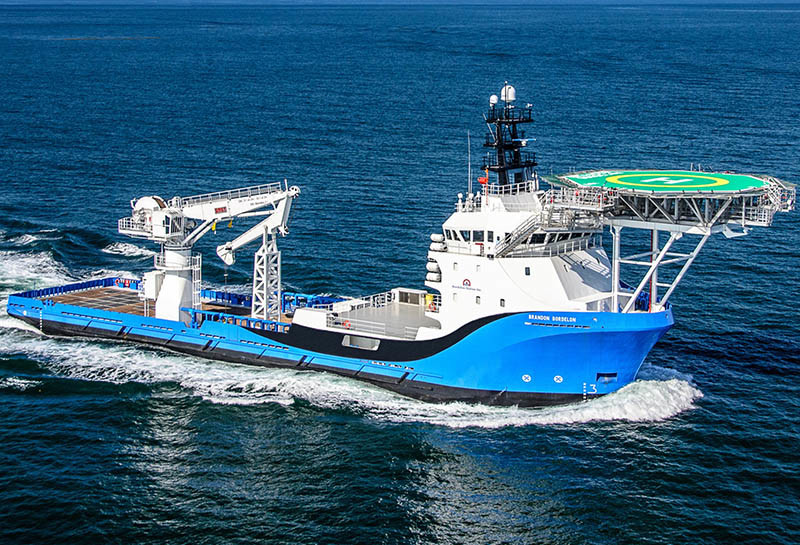The Coast Guard released a policy letter (CG-CVC Policy Letter 22-03 ) late last month that provides guidelines when considering requests for vessels to participate in hurricane relief efforts. The policy letter will expire on Jan. 31, 2023.
The Coast Guard "recognizes that sealift capacity is an efficient and effective means to provide relief supplies following hurricane damage."
Vessels operating within the conditions outlined in their Certificate of Inspection (COI) generally do not need additional permission from the Coast Guard to engage in relief operations. When the Coast Guard, Maritime Administration (Marad), Federal Emergency Management Agency (FEMA), or other government agency identifies that a sufficient number or type of vessels are not available to provide the needed support, the Coast Guard may permit certain exemptions to aid in relief efforts, the policy letter said.
Vessels that require exemptions or equivalency determinations to support hurricane relief efforts may require approval from the Office of Commercial Vessel Compliance (CG-CVC), the Office of Design and Engineering Standards (CG-ENG), or the Marine Safety Center (MSC), the Coast Guard said. Vessel owners and operators should submit these requests in writing to the local OCMI. If necessary, the OCMI will forward the request via the District Commander to CG-CVC for action, the Coast Guard said.
Requests should be accompanied by documentation showing the need for the vessel’s services, a gap analysis of the regulations the vessel does not meet, and a description of the relief activities that the vessel will perform.
The Offshore Marine Service Association (OMSA) thanked the Coast Guard for issuing the policy letter that provides a "transparent and expedited process for domestic offshore energy vessels to participate in disaster recovery activities." OMSA said the letter "will provide a transparent pathway for U.S. offshore energy vessels to participate in disaster recovery activities, thereby increasing our domestic response capabilities."
“This is a great example of our partners in the U.S. Coast Guard working with industry to provide common-sense solutions so that American mariners can be utilized to help their fellow citizens,” said OMSA Director of Regulatory Affairs, Michael Heier.
The offshore energy industry uses highly complex vessels that make them attractive candidates for disaster recovering missions. For example, offshore supply vessels (OSVs) have large internal tanks to carry potable water or fuel, and large decks to carry vehicles, containers, or fuel tanks. The size of these vessels makes them useful in getting into small, unimproved, or damaged ports. However, OMSA said, under current law and regulations, the Coast Guard has numerous and very prescriptive requirements for numerous different types of vessels and what activities these vessels may engage in. "Together, these points mean that there are often times when offshore energy vessels could safely engage in disaster recovery operations, but a strict reading of the regulations prevents them from doing so," OMSA said.
OMSA said the policy letter represents another chapter of OMSA and the Coast Guard working together to provide U.S. vessel responses to natural disasters. In the aftermath of Hurricane Maria, several Louisiana-based energy vessels attempted to carry cargo to Puerto Rico or between ports within Puerto Rico. While these vessels were capable of safely completing these tasks, many were turned back due to strict or differing interpretations of Coast Guard regulations, OMSA said.
To prevent this in the future, OMSA proposed that the Coast Guard use its industry advisory committee, the National Offshore Safety Advisory Committee (NOSAC), to study how offshore energy vessels could be safely utilized to provide disaster assistance. NOSAC accepted OMSA’s proposals and in 2019 NOSAC produced a report entitled, “Use of Offshore Supply Vessels (OSVs) and other vessels in restoration and recovery efforts,” written by NOSAC members Chad Fuhrmann and Terry Bono.
“Unlike the unlawful, unhelpful, and unnecessary Jones Act waiver issued by the Biden administration to BP, the USCG policy letter is a great example of a lawful and truly helpful step that the government can take to help disaster victims," said OMSA President Aaron Smith. "Furthermore, it is an example of a step that honors American mariners and shipyard workers as well as the companies that have invested in U.S. vessels.”
OMSA had previously opposed the Biden administration’s Jones Act waiver that was provided to BP to use a foreign-built and foreign-crewed vessel to move 300,000 bbls. of diesel from Houston to San Juan, Puerto Rico. OMSA opposed the waiver because there were U.S.-built and crewed vessels available.
The waiver set a dangerous precedent that negates the underlying principles of national and homeland security realized through the Jones Act, OMSA said.
“Much like we have seen in their opposition to the American Offshore Worker’s Fairness Act, oil majors will say and do anything to avoid using U.S. vessels and crews if it means they can make a buck," Smith said. "Instead of enabling their exploitation of the American public, I hope the administration will take more actually helpful actions, like the recently issued policy letter, and fewer actions which don’t help those in need while simultaneously harming American mariners.”




